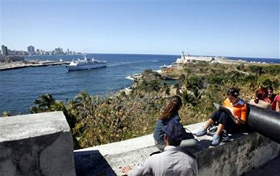 |
 |
 |
 Editorials | At Issue | February 2006 Editorials | At Issue | February 2006  
Latest U.S.-Cuba Conflict May Have Greatest Repercussions in Mexico
 Eduardo Stanley - New America Media Eduardo Stanley - New America Media


| | The Black Prince cruise ship arrives in the Havana bay as students read books during the annual International Book Fair in Havana, Cuba. (AP/Javier Galeano) |
A recent energy meeting between American businessmen and a Cuban delegation was cut short when the staff of the María Isabel Sheraton hotel, located in downtown Mexico City, expelled the Cuban representatives under pressure from Washington.

According to American authorities, the Treasury Department applied the 1996 Helms-Burton law, an expansion of the U.S. embargo against Cuba that has been in effect since 1962. The law penalizes all companies that do business with Cuba.

Observers in Mexico were quick to react to the incident.

The Mexican government cautiously announced that it would investigate the case to determine whether the United States had violated their sovereignty by demanding that a company in Mexico follow American law. The majority of critics, activists, journalists and political groups, however, stated plainly that they had no doubt that Washington should be censured for the incident, along with Mexico’s Fox administration for its weakness in dealing with the United States.

Mexican President Vicente Fox responded to critics by declaring that he would not allow relations with the United States to be damaged under any circumstances. Mexican Secretary of Foreign Relations Luis Ernesto Derbez affirmed that no violation of Mexico’s sovereignty had taken place and that only the company that runs the Sheraton would be subject to fines. Meanwhile, in Washington, American authorities argued that their laws should apply anywhere, regardless of state lines.

According to the well-known journalist Raymundo Riva Palacio, the Mexican government’s stance is unfortunate and reflects a history of acquiescence to U.S. policies. In his Feb. 8 column in the Acapulco newspaper El Sur, Riva Palacio writes, “The most openly pro-American government that Mexico has had in decades is so cowardly it’s unbelievable. How can you sanction a U.S.-based hotel without the George W. Bush administration taking it as an insult?”

The newspaper recounts the history of U.S. interference in Mexico -- from Washington’s manipulation of high ranking civil employees to its bribery of police and security agents to urge them to share information with the CIA before going to their own superiors. According to the journalist, the CIA has influenced newspapers and bribed journalists, financed rightwing organizations in Mexico to attack liberals and was responsible for the assassination of a Soviet diplomat in Mexico.

The Sheraton hotel has been the center of CIA operations in Mexico for a long time, Riva Palacio claims. And from what we’ve seen, it continues to be.

Riva Palacio denounces the hypocrisy of Mexico’s relations with Cuba. Mexico was the only Latin American country that did not criticize Washington’s order for all countries on the continent to break diplomatic ties with the island in 1964. But according to the journalist, this was not an act of sovereignty as the Mexican government has claimed, but was an agreement with Washington, in which Mexico would become the center of espionage and secret operations against the Fidel Castro administration.

This “farse,” as Riva Palacio calls it, stopped being funny when Fox took office and his foreign minister at the time, Jorge Castañeda, followed Washingon to the ends of servile obedience in its obsession with Cuba. “The most important thing about Fox is that he no longer bows (to Washington) in secret but now does it for all the world to see,” concludes Riva Palacio in reference to the latest conflict with Cuba.

The nature of the U.S.-Mexico relationship is reflected in a recent cartoon by Latino humorist Lalo Alcaráz. The comic is a spin-off of the poster for Brokeback Mountain, a film about the love story between two cowboys. In Alcaráz’s version, titled “Brokeborder Mountain,” published Feb. 3 in Noticiero Semanal, the two cowboys are Presidents Bush and Fox. Bush says, “Vicente Fox, why can’t I quit you?” and Fox responds, “I don’t know, George, my love.”

The cartoonist’s sarcasm on the topic of immigration reflects Mexicans’ perception that their president is continually conceding to the White House’s unilateral proposals.

Where does this leave Cuba? Since it protested the expulsion of its officials from the Sheraton Hotel, the Cuban government seems to be remaining calm. According to newspaper reports, Havana does not want the matter to affect the chances of current Mexican presidential candidate Andrés Manuel López Obrador of the Democratic Revolutionary Party (PRD), a popular candidate who many are trying to paint as a “leftist.”

The latest U.S.-Cuba conflict may have the greatest effect on the deteriorating image of Mexican President Fox, whose foreign relations policy seems to be a caricature of itself. | 
 | |
 |



